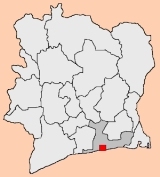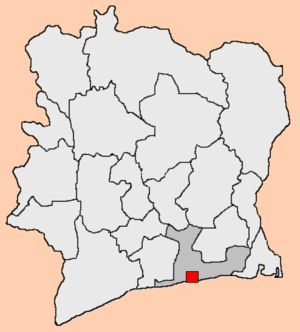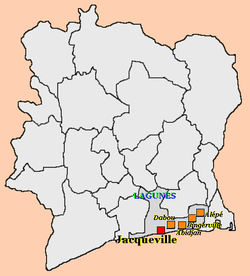
Jacqueville
Encyclopedia

Côte d'Ivoire
The Republic of Côte d'Ivoire or Ivory Coast is a country in West Africa. It has an area of , and borders the countries Liberia, Guinea, Mali, Burkina Faso and Ghana; its southern boundary is along the Gulf of Guinea. The country's population was 15,366,672 in 1998 and was estimated to be...
. Jacqueville Department is part of the Lagunes Region. The town of Jacqueville is so named because it was the first place in Côte d'Ivoire where the Union Flag
Union Flag
The Union Flag, also known as the Union Jack, is the flag of the United Kingdom. It retains an official or semi-official status in some Commonwealth Realms; for example, it is known as the Royal Union Flag in Canada. It is also used as an official flag in some of the smaller British overseas...
was raised when the British
United Kingdom
The United Kingdom of Great Britain and Northern IrelandIn the United Kingdom and Dependencies, other languages have been officially recognised as legitimate autochthonous languages under the European Charter for Regional or Minority Languages...
originally occupied the country. It grew as a French
France
The French Republic , The French Republic , The French Republic , (commonly known as France , is a unitary semi-presidential republic in Western Europe with several overseas territories and islands located on other continents and in the Indian, Pacific, and Atlantic oceans. Metropolitan France...
colonial
Colonialism
Colonialism is the establishment, maintenance, acquisition and expansion of colonies in one territory by people from another territory. It is a process whereby the metropole claims sovereignty over the colony and the social structure, government, and economics of the colony are changed by...
slave
Slavery
Slavery is a system under which people are treated as property to be bought and sold, and are forced to work. Slaves can be held against their will from the time of their capture, purchase or birth, and deprived of the right to leave, to refuse to work, or to demand compensation...
port
Port
A port is a location on a coast or shore containing one or more harbors where ships can dock and transfer people or cargo to or from land....
, but is now primarily a fishing port and seaside resort
Seaside resort
A seaside resort is a resort, or resort town, located on the coast. Where a beach is the primary focus for tourists, it may be called a beach resort.- Overview :...
.
It is virtually an island, separated from most of the country by the Ébrié Lagoon
Ébrié Lagoon
The Ébrié Lagoon lies in Côte d'Ivoire, separated for most of its length from the Atlantic Ocean by a narrow coastal strip. The 100 km long lagoon is linked to the sea by the Vridi Canal, while the Comoë River flows into it. The lagoon averages 4 km in width, and 5 m in depth...
, its other shore being on the Gulf of Guinea
Gulf of Guinea
The Gulf of Guinea is the northeasternmost part of the tropical Atlantic Ocean between Cape Lopez in Gabon, north and west to Cape Palmas in Liberia. The intersection of the Equator and Prime Meridian is in the gulf....
. The only way to reach the island involves taking a ferry
Ferry
A ferry is a form of transportation, usually a boat, but sometimes a ship, used to carry primarily passengers, and sometimes vehicles and cargo as well, across a body of water. Most ferries operate on regular, frequent, return services...
across the lagoon. Amongst other things Jacqueville is noteworthy for the local pineapple
Pineapple
Pineapple is the common name for a tropical plant and its edible fruit, which is actually a multiple fruit consisting of coalesced berries. It was given the name pineapple due to its resemblance to a pine cone. The pineapple is by far the most economically important plant in the Bromeliaceae...
s ("ananas sauvage") which are long narrow and have completely white and very sweet flesh. When nitrate fertilisers are used in their cultivation they become yellow and taste much more like a conventional pineapple.
History
The department of Jacqueville was created in 1997 and is located 60 km from AbidjanAbidjan
Abidjan is the economic and former official capital of Côte d'Ivoire, while the current capital is Yamoussoukro. it was the largest city in the nation and the third-largest French-speaking city in the world, after Paris, and Kinshasa but before Montreal...
, the economic capital of the Ivory Coast.
Economy
The development of the department of Jacqueville is founded on extensive farming of coconutCoconut
The coconut palm, Cocos nucifera, is a member of the family Arecaceae . It is the only accepted species in the genus Cocos. The term coconut can refer to the entire coconut palm, the seed, or the fruit, which is not a botanical nut. The spelling cocoanut is an old-fashioned form of the word...
s. The money generated from coconut farming has provided a base for infrastructure
Infrastructure
Infrastructure is basic physical and organizational structures needed for the operation of a society or enterprise, or the services and facilities necessary for an economy to function...
development. Local government has been making an effort to foster a transition from an agricultural to a more modern economy.
The economy
Economy
An economy consists of the economic system of a country or other area; the labor, capital and land resources; and the manufacturing, trade, distribution, and consumption of goods and services of that area...
of the department of Jacqueville depends on the following sectors:
- Agricultural production
- Cash crops - the principal cash crops are coconutCoconutThe coconut palm, Cocos nucifera, is a member of the family Arecaceae . It is the only accepted species in the genus Cocos. The term coconut can refer to the entire coconut palm, the seed, or the fruit, which is not a botanical nut. The spelling cocoanut is an old-fashioned form of the word...
, palm oilPalm oilPalm oil, coconut oil and palm kernel oil are edible plant oils derived from the fruits of palm trees. Palm oil is extracted from the pulp of the fruit of the oil palm Elaeis guineensis; palm kernel oil is derived from the kernel of the oil palm and coconut oil is derived from the kernel of the...
and Para rubberPara rubber treeHevea brasiliensis, the Pará rubber tree, often simply called rubber tree, is a tree belonging to the family Euphorbiaceae, and the most economically important member of the genus Hevea... - Food cropsAgricultureAgriculture is the cultivation of animals, plants, fungi and other life forms for food, fiber, and other products used to sustain life. Agriculture was the key implement in the rise of sedentary human civilization, whereby farming of domesticated species created food surpluses that nurtured the...
- The principal food crop is CassavaCassavaCassava , also called yuca or manioc, a woody shrub of the Euphorbiaceae native to South America, is extensively cultivated as an annual crop in tropical and subtropical regions for its edible starchy tuberous root, a major source of carbohydrates...
- Cash crops - the principal cash crops are coconut
- Animal farming and fishing
- AnimalAnimalAnimals are a major group of multicellular, eukaryotic organisms of the kingdom Animalia or Metazoa. Their body plan eventually becomes fixed as they develop, although some undergo a process of metamorphosis later on in their life. Most animals are motile, meaning they can move spontaneously and...
Raising of sheep, bovines, caprine and porcins. - FishingFishingFishing is the activity of trying to catch wild fish. Fish are normally caught in the wild. Techniques for catching fish include hand gathering, spearing, netting, angling and trapping....
Fishing is common in the sea and lagoon.
- Animal
- Industry
- Agricultural processing - Two factories produce coconut oil, palm oilPalm oilPalm oil, coconut oil and palm kernel oil are edible plant oils derived from the fruits of palm trees. Palm oil is extracted from the pulp of the fruit of the oil palm Elaeis guineensis; palm kernel oil is derived from the kernel of the oil palm and coconut oil is derived from the kernel of the...
and coconut râpé. - AgroforestryAgroforestryAgroforestry is an integrated approach of using the interactive benefits from combining trees and shrubs with crops and/or livestock.It combines agricultural and forestry technologies to create more diverse, productive, profitable, healthy and sustainable land-use systems.-Definitions:According to...
- Energy Resources - Oil and gas fieldsOil fieldAn oil field is a region with an abundance of oil wells extracting petroleum from below ground. Because the oil reservoirs typically extend over a large area, possibly several hundred kilometres across, full exploitation entails multiple wells scattered across the area...
are exploited across the department - TransportTransportTransport or transportation is the movement of people, cattle, animals and goods from one location to another. Modes of transport include air, rail, road, water, cable, pipeline, and space. The field can be divided into infrastructure, vehicles, and operations...
: Transport is mainly land-based and is serviced by regular lines going to Abidjan and DabouDabouDabou is a town in Dabou Department of Côte d'Ivoire, located in the country's Lagunes Region. Dabou is also the port city that dominates that department. The area is served by Dabou Airport....
. Service roads connect the various villages with varying usability depending on the state of the roads, in particular on the mainland. There is regular ferry service to N'djem.
- Agricultural processing - Two factories produce coconut oil, palm oil
- Tourism - There is no organized tourismTourismTourism is travel for recreational, leisure or business purposes. The World Tourism Organization defines tourists as people "traveling to and staying in places outside their usual environment for not more than one consecutive year for leisure, business and other purposes".Tourism has become a...
industry. However, there are varied tourist possibilities in the department:- Seaside tourism (75 km coastline);
- LagoonLagoonA lagoon is a body of shallow sea water or brackish water separated from the sea by some form of barrier. The EU's habitat directive defines lagoons as "expanses of shallow coastal salt water, of varying salinity or water volume, wholly or partially separated from the sea by sand banks or shingle,...
tourism (islands, 150 km of banks and a lake village), - Endogenous tourism (Lakes Jacqueville and Abreby),
- Sporting tourism (car rally, fishing for sport),
- Cultural tourismCultural tourismCultural tourism is the subset of tourism concerned with a country or region's culture, specifically the lifestyle of the people in those geographical areas, the history of those peoples, their art, architecture, religion, and other elements that helped shape their way of life...
(colonial buildings, traditional dance, song and cuisine)
Other infrastructure
-
- Health - A general hospital, 10 rural health centres, a social center
- Education and training - a municipal college, a professional factory maintenance college, 44 primary schools, 4 nursery schools, a women's institute for education and training (IFEF).
- Media - a local radio station (Radio FATCHUE, 104.4 FM)
- Religion - made-up of Christians, Muslims and syncretists;
- Culture - dance, drums, sacred forests - Abreby and Gd-Jack, traditional values like the matriarchal succession.
Demography
In 1998 the department of Jacqueville had around 53 000 inhabitants, according to the General Population and Housing Census (RGPH - 98), including 27 000 men and 26 000 women at a density of 78 people per square kilometre. As of 2007, the department has 61 000 inhabitants; this population accounts for 0.3% of the Ivory Coast population and is increasing at a rate of 2.1%. The population is mainly rural, with 41 000 people in the countryside (1998) and 12 000 (1998) in the towns, a rate of urbanization of 23%.The population is largely made-up of the Akan people
Akan people
The Akan people are an ethnic group found predominately in Ghana and The Ivory Coast. Akans are the majority in both of these countries and overall have a population of over 20 million people.The Akan speak Kwa languages-Origin and ethnogenesis:...
; 22 000 in 1998, accounting for 41% of the population, the balance consists of other Ivory Coast and non-Ivory Coast ethnicities. The population is very young; 74% are less than 18 years old.
Communes


